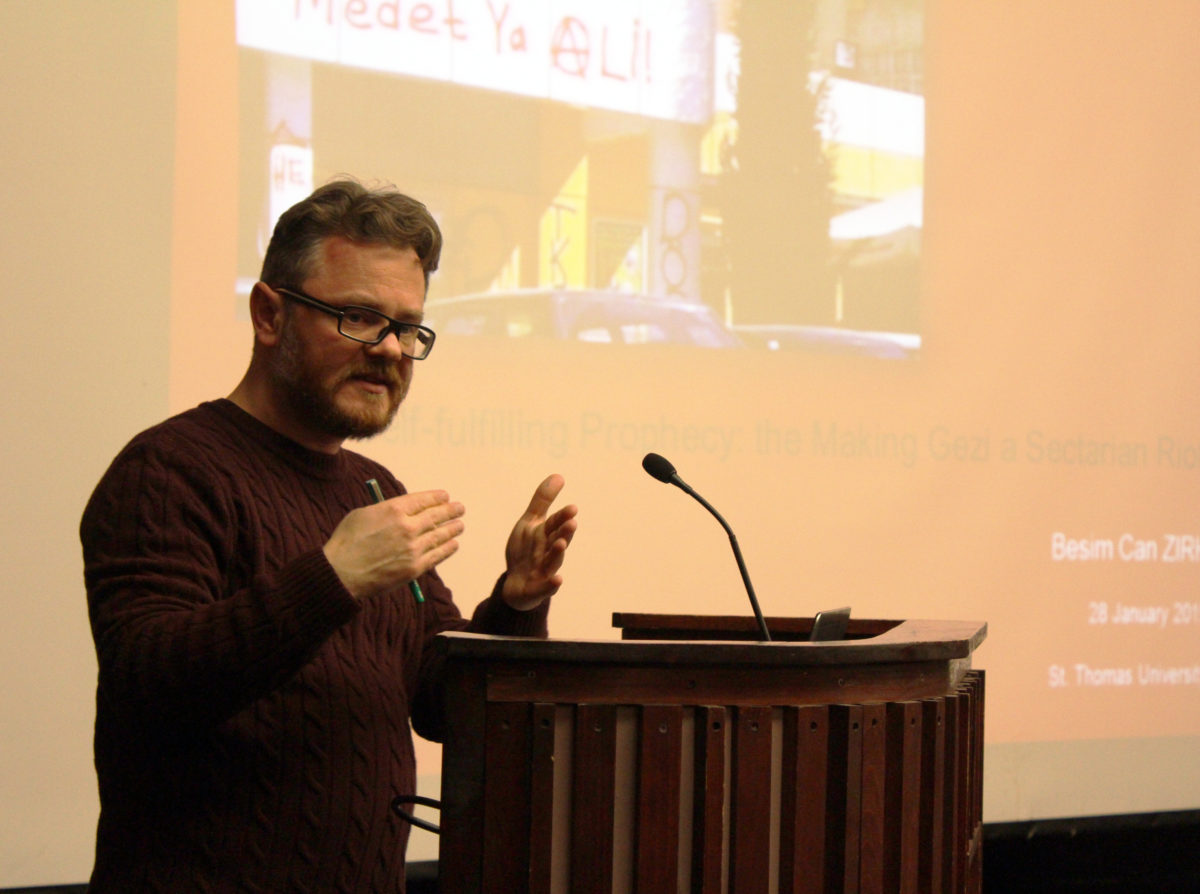People are raising their voices now more than ever, says St. Thomas University’s visiting scholar Besim Can Zirh of Turkey. Given the militarization of police, he sees no end in sight to blood shed in the name of equality.

His lecture Wednesday night at STU focused on the Gezi protests of 2013 in Turkey, which made the country’s general election in June a likely turning point for the nation divided over religious influence in politics, and for protest movements worldwide.
For the first time in the lives of many Turks, “They went out to the streets and shouted as loud as they could. This is the last thing they could do. They did this, and nothing changed,” Zirh said.
The Taskim Gezi Square protest in Istanbul began as a sit-in against commercial development in the park, and gained spin-off protests across the country. Zirh was in Ankara, the Turkish capital, where less international media coverage meant more ruthless police tactics.
Across Turkey, the months-long protest led to 11 deaths, nine of whom were of the minority Alevi division of Islam, and 3,000 arrests were made. After, then-Prime Minister and now President Recep Tayyip Erdogan, helped militarize police and increase their presence. Now, a new “security package” awaits approval in parliament.
“Acording to this package, I can be taken into custody without any reason. Maybe an ordinary police officer doesn’t like what I’m wearing, my face, my appearance, and he can take me under custody according to the new legislation,” Zirh said.
Police used even heavier force in Turkey’s mostly ethnic-Kurdish Southeast, bordering Iraq and Syria, where Kurds have long fought for self-governance through federalism. Attacks on the town of Kobane in December by Islamic State of Iraq and Syria rebels led to mass demonstrations for Erdogan to take action, which in turn have led to 42 protestors killed in a mass police crackdown.
From the outset, Turkey was formed as a secular nation. The conservative-Islamist Justice and Development Party (AKP) government has set Turkey’s course toward an Islamic nation since coming to power in 2002.
The results for the largely Kurdish People’s Democracy Party (HDP) will weigh heavily on the future of Turkey. The party’s candidates ran as independents in the 2007 election to bypass a 10 per cent election threshold. Last week, it announced it would return to run as a party this year.
Zirh considers this an invitation for Turks to break traditional voting patterns.
“I think it’s a very smart move; an attempt to challenge this threshold and turn their face to the Turkish people and say that ‘see, if we are not able to get the parliament, everything will get worse,’” Zirh said.
But Kurdish rebels have a history of violence in the country, and Erdogan will likely use this as a reason to use his pending police powers.
Zirh’s trip to Canada, his first time in North America, has him putting these recent protests and the prospect of more police brutality around the June 7 general election into a global perspective.
“I have no expectation whatsoever about what I’m going to experience here,” he said. “But it was so interesting for me personally that… when I was trying to explain the Gezi protest, people immediately are trying to make a connection by referring to some local events.”
“Then I realized… how common with the Gezi protests [are] with the fracking issues, and First Nations demands about their own territory, and how the governments play on behalf of the corporates not the people, and try to impose by using some new tools to suppress the objections. It was so interesting for me to see how similar it is.”
Much like Occupy Wall Street, the Gezi Park protest formed out of a sit-in against commercial development in the park, and spawned into something bigger, but less defined.
“It was a kind of a call for any people who want to make a noise, and not even with words,” Zirh said of the Gezi protest. “Just some kind of noise to signal that, ‘wait a minute, I’m also here.’”
